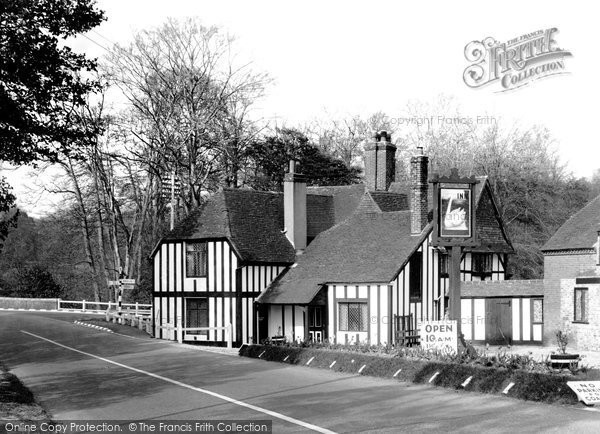Living In The Swan Inn Newtown 1936 1943
A Memory of Newtown.
I lived at the Swan from 1936 to about 1943 - below are some extracts from my memoirs. I hope you find them of interest.
In about 1936 my father resigned, or to be more accurate was forced out of his company, a story in itself. My mother was getting concerned about the rise of the Nazis in Germany and the very real possibility of a war starting and wanted to leave the London area. The result was that my parents became the proprietors of Ye Olde Swan Inn in the village of Newtown just outside the old market town of Newbury in the County of Berkshire. A river ran through Newtown and the bridge crossing the river was the County demarcation line between Berkshire and Hampshire. So Newtown was in Hampshire, Newbury in Berkshire. The inn dated back to the 12th century when it was a bake house to nearby Sandleford Priory a large estate nearby. A newspaper article on the Swan some years later stated that there was a connecting underground passage between the Priory and the bake house, “presumably to keep bread dry in wet weather, and was in all probability used more often as a means of escape when danger threatened the occupants of the Priory”. (I have always been puzzled by that statement. Because to be connected with the Inn, the passage would have had to go under the river.) The bake house became an inn in 1448. It was in the original Tudor style with black exposed timbers and white painted plaster infill.
It stood at the intersection of the main Winchester road and a road leading to the village. The intersection formed a V and the Swan was situated in the V. The Swan in those days was not connected to a sewage system and all the toilets were chemical toilets, which had to be routinely emptied into a pit. I never actually discovered where. Perhaps I did not really want to know.
One interesting side note, I came back to visit the Swan in the 1980’s and found it undergoing extensive renovation. Going upstairs to my parent’s bedroom I took a look at the dividing wall between the bedroom and the bathroom. It was constructed in the mediaeval method of wattle and daub; this type of construction pre-dated wood studs and horizontal thin wood lathing strips nailed to the studs to provide a physical base for the plaster finish. Wattle and daub techniques used rough cut wood branches not necessarily straight and weaving the wood supports with thin pliable willow twigs horizontally (wattle). The structure was then daubed with mud pushed into and through the thicket of twigs and then smoothed over. These walls were solid, provided excellent insulation and lasted forever.
There were some encumbrances, which came with running the Swan. The first was that there was a petrol (gas) pump located in the parking area. My father had it removed eventually as he was tired of been woken up in the middle of the night by drivers honking their horn to get a refill. The other encumbrance was a 1936, 36 seater bus. This bus was the only means of transport for the local kids to get to school, my mother - all 5’-1” of her - had to obtain a bus driver's license and drive all over the area through narrow country lanes picking up children and delivering them to school and the same routine in the evening bringing them back home. We used to go shopping in it to Newbury, quite an experience and not easy to park in a crowded market town. This lasted until the war started when my father was called up in the RAF and mother had to run the pub by herself. The bus was released to pasture!
I was in London staying at my Club the Royal Overseas League off St James Street in 1993,reading the Telegraph in the Reading Room and came across an article regarding a visit to London by the President of Russia. He bought with him a number of items belonging to former British prisoners of war. These items had being captured along with the Germans and had resided deep in the Kremlin archives for over forty years. They included this gentlemen’s diary and the paper quoted some of his entries, which included his comments on my mother’s oysters. I wish my mother had been alive she would have appreciated that. The gentleman in question had died by then also and his son was astonished to know that his father had even kept a diary.
Howard Johnson –Mill Valley - California - 2009
By Howard Johnson
Add your comment
You must be signed-in to your Frith account to post a comment.
Add to Album
You must be signed in to save to an album
Sign inSparked a Memory for you?
If this has sparked a memory, why not share it here?




Comments & Feedback
Be the first to comment on this Memory! Starting a conversation is a great way to share, and get involved! Why not give some feedback on this Memory, add your own recollections, or ask questions below.